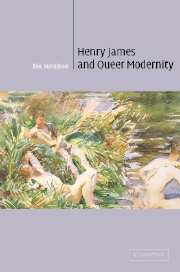Book contents
- Frontmatter
- Contents
- Acknowledgments
- List of abbreviations
- Introduction
- 1 Indiscreet anatomies and protogay aesthetes in Roderick Hudson and The Europeans
- 2 The elusive queerness of “queer comrades”: The Tragic Muse and “The Author of ‘Beltraffio’”
- 3 The Turn of the Screw, or: The Dispossessed Hearts of Little Gentlemen
- 4 Masculinity “changed and queer” in The Ambassadors
- 5 Gratifying “the eternal boy in us all”: Willa Cather, Henry James, and Oscar Wilde
- 6 “The other half is the man”: the queer modern triangle of Gertrude Stein, Ernest Hemingway, and Henry James
- Coda: “Nobody is alike Henry James.” Stein, James, and queer futurity
- Notes
- Bibliography
- Index
6 - “The other half is the man”: the queer modern triangle of Gertrude Stein, Ernest Hemingway, and Henry James
Published online by Cambridge University Press: 22 September 2009
- Frontmatter
- Contents
- Acknowledgments
- List of abbreviations
- Introduction
- 1 Indiscreet anatomies and protogay aesthetes in Roderick Hudson and The Europeans
- 2 The elusive queerness of “queer comrades”: The Tragic Muse and “The Author of ‘Beltraffio’”
- 3 The Turn of the Screw, or: The Dispossessed Hearts of Little Gentlemen
- 4 Masculinity “changed and queer” in The Ambassadors
- 5 Gratifying “the eternal boy in us all”: Willa Cather, Henry James, and Oscar Wilde
- 6 “The other half is the man”: the queer modern triangle of Gertrude Stein, Ernest Hemingway, and Henry James
- Coda: “Nobody is alike Henry James.” Stein, James, and queer futurity
- Notes
- Bibliography
- Index
Summary
Among the more overt targets of Ernest Hemingway's neglected parody The Torrents of Spring (1926) are his former mentors Gertrude Stein and Sherwood Anderson. Less obviously, but not coincidentally, the work marks Hemingway's first notable public engagement with Henry James, both as master and as man – or rather, as something less than a man. In The Sun Also Rises (1926), drafted before but published after Torrents, James's alleged sexual damage – or what his autobiography obscurely called an “obscure hurt” – constitutes an historical parallel for Jake Barnes's impairment, with the implied distinction that Barnes had come by his disabling wound through active service in the military, unlike the already unmasculine James (AU 415). More privately, Hemingway went on to demean the drawing-room “fairies” who languished about in James's The Awkward Age (1899), to scorn his predecessor under the sign of emasculation (James had “no balls”) and effeminacy (one of the “male old women”), to dismiss most of James's writing as “snobbish, difficultly written shit” – and to covet his transatlantic fame (SL 266, 673, 703). Only after Hemingway won the Nobel Prize in 1954 could he publicly concede that James ought to have received the honor, too. Yet like the other modern writers under survey here, Hemingway continued to feel James's monumental presence up until the end of his career, as seen from the continued skirmishing with James in True at First Light (composed 1953–4) and A Moveable Feast (composed 1957–8).
- Type
- Chapter
- Information
- Henry James and Queer Modernity , pp. 173 - 204Publisher: Cambridge University PressPrint publication year: 2003



